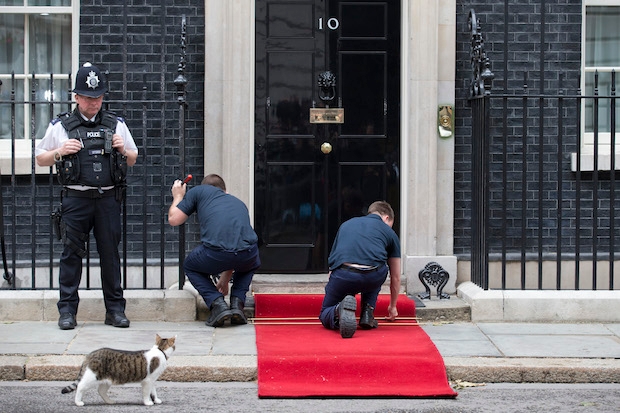Lyndon Johnson’s first lesson of politics was to be able to count. It’s something that many of those commenting on the various post-election scenarios could do with remembering. Let’s start with those who think that there is some overriding importance in being the largest single party and that this gives you the right to form a government, even if you lack a majority. It is never clear what people expect the other parties to do in such a scenario.
Assume, for example, that after the election the Conservatives are the largest party but without a majority, and there is an anti-Conservative block that is larger. Do we really expect the anti-Conservative parties just to shrug their shoulders, say ‘oh well’, and put the Conservatives into power? And even if they did that, then what? Given that there will be a Commons majority against that government, do we expect the opposition parties to abstain on votes just to let the government get their way? This is ‘After You Claude’ stuff, but it’s not how politics works. Just remember LBJ’s lesson: numbers, not bogus arguments about legitimacy, will determine who gets in to Number 10 after the election.
Similarly innumerate are those in the SNP who claim that they can work with Labour’s more left-leaning MPs to help push a minority Miliband government in the right (by which they mean left) direction. True, there will be a lot of Labour rebel MPs after the next election. Those of us who study these things will not be short of work. But however large the SNP contingent at Westminster and however large the ructions within Labour’s ranks, the parliamentary arithmetic is such that the SNP will only be able to defeat a Labour government – whether it is a minority or majority government – if SNP MPs are willing to vote with the Conservatives. I have no doubt they will be willing to do so – that’s political life – but for some reason this is never mentioned by the SNP when discussing how much leverage they might exert.
And then there’s Labour. In the event that Labour does not secure a majority, Ed Miliband has made it clear that he rules out any deal – either a coalition or a formal confidence and supply arrangement – with the SNP. The logic behind this is straightforward. The SNP have explicitly said they will do nothing to put the Conservatives into Downing Street; it seems safe to assume that this will include not triggering another early election (at least for a year or so, anyway), not least because the only people that will benefit from a second election – given their funding – are the Conservatives; and so, the argument goes, Ed Miliband can call the SNP’s bluff.
This might get Ed Miliband into Number 10, but there is a real difference between getting into government and then governing. Calling the SNP’s bluff only helps with the first of these. After that, on vote after vote, deals will have to be done, or the government will achieve nothing. The pro-bluff case is that the SNP have fewer ways to amend the budget than they appear to think, and that at least on crucial issues, such as Trident, Labour could rely on Conservative votes to secure a majority.
All true, but look beyond the key votes and things look much messier. A lack of a government majority would also mean no government majority in the Commons’ various committees – both select committees and public bill committees. Most importantly of all there would be no government majority on the various programme motions that timetable legislation.
This sounds very dull and procedural. But procedure matters. Ask Nick Clegg. In 2012, with Labour support, the government easily won the vote for the second reading of the House of Lords Bill, despite an enormous Conservative backbench rebellion. But Labour’s support did not extend to the Bill’s programme motion, where the government whips faced a similar-sized rebellion. In the face of almost certain defeat, the government withdrew the programme motion. Trying to legislate on Lords’ reform without control of the timetable would have been next-to-impossible and so shortly afterwards the Bill was abandoned.
The same would be true this time. On bill after bill, the opposition parties could combine to bog the government down, dragging out legislation for months, keeping MPs up all night in the sort of all-night sittings that had (thankfully) become a thing of the past. If you think parliament legislates too much, and maybe it would be good if it slowed down a bit, then you might applaud this, but trying to govern like this would be hellishly difficult. There may be no Deal, then, but there will have to be deals.
The more macho elements within Labour are fond of quoting Michael Corleone, in the Godfather Part II, when dealing with the corrupt Senator Geary. ‘My offer is this,’ says Corleone: ‘nothing’. But to make that approach work Michael Corleone had to be willing to murder a prostitute and dupe the Senator into thinking he’d killed her. Rosie Winterton is a very effective Chief Whip but she won’t go quite that far. Plus Michael Corleone didn’t have to worry about winning programme motions.
Philip Cowley is Professor of Parliamentary Government at Nottingham University






Comments